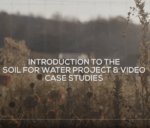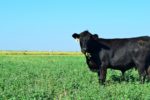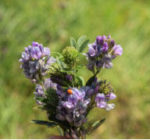The educational materials listed on this page are about Agroecosystems.
What is agroecology? An agroecosystem is any ecosystem managed primarily for the production of food, fuel or fiber. Agroecology is the study of agricultural ecosystems and the natural resources required to sustain them. Ecological farming requires producers to work within their environmental limitations and use technology to address ecosystem constraints, and gain a competitive edge in the marketplace. Agroecological management enhances the sustainability of agricultural ecosystems by trying to work with the ecological relationships and processes within the broader ecosystem. Agroecology promotes the conservation of soil and organic matter, as well as other resources such as energy and water. Agroecosystems reflect diversity in the landscape, through crop/livestock integration and in marketing. They also seek to strengthen farmers and their communities by developing local agricultural knowledge and building ties among farmers and their consumers.
Key practices include the use of cover crops, crop rotation, reduced tillage, buffer strips, rotational grazing, seed saving and planting heirloom crops, and pasture and rangeland management.
SARE's Systems Research for Agriculture provides helpful tips for farmers or researchers interested in agroecology research. SARE agroecology books such as Building Soils for Better Crops, Crop Rotation on Organic Farms and Managing Cover Crops Profitably can help producers put agroecology in action. Rangeland Management Strategies features guidance on improving range for grazing. The SARE book Manage Insects on Your Farm: A Guide to Ecological Strategies describes how to control insect pests using a systems-level, agroecological approach.
Showing 1-3 of 3 results

Soil for Water
This series of 11 semi-structured interviews was carried out by Virginia Tech and Virginia Cooperative Extension to better understand farmers’ and ranchers’ agroecological motivations and values related to the protection and conservation of water resources. The series highlights diverse farms of Virginia’s agricultural community through a narrative inquiry framework. Introduction to the Soil for Water […]

The Performance of Cover Crops in Minimally Tilled Forage-based Grazing Systems
In a Southern SARE-funded Graduate Student Grant (GS15-152), “Evaluation of Winter Annual Cover Crops Under Multiple Residue Management: Impacts on land management, soil water depletion, and cash crop productivity,” Texas Tech University researchers investigated five cover crops species as potential complements to a warm-season beef-stocker grazing system. The impact of the project was two-fold: Stabilize the soil surface from excessive wind erosion and desiccation; and strengthen rural communities by ensuring the persistence of profitable agriculture in the region.

Integrating Legumes with Grass to Improve Forage-Livestock Systems
In a Southern SARE-funded Research and Education Grant (LS14-261), "Long-term Agroecosystems Research and Adoption in the Texas Southern High Plains -- Phase III," Texas Tech University researchers conducted a steer grazing trial comparing a grass only system to a grass-legume system for animal productivity and water use efficiency.